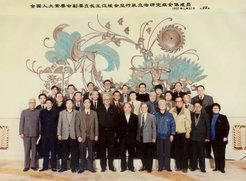Die chinesische Verwaltungsrechtswissenschaft und die Entstehung eines chinesischen Verwaltungsprozessrechtssystems in den 1980ern
Akteure–Wissen–Translation
Forschungsprojekt

Beijing 1986: Eight years after Deng Xiaoping initiated the reform and opening-up policy (改革开放), a significant transformation encompassing all aspects of the Chinese economy, society and law took place. In October that very same year, the Administrative Legislation Research Group (行政立法研究组) (referred to Research Group hereafter) was founded. This group assembled legal experts and scholars, members of the Legal Affairs Commission of the National People’s Congress Standing Committee, and personnel from practical departments. The 14 initial members were led by the scholars Jiang Ping (江平), Luo Haocai (罗豪才) and Ying Songnian (应松年) – already guiding lights of Chinese jurisprudence at that time. Their goal was to advise the Legislative Affairs Commission on its administrative legislation and remedy the troublesome shortage of normative knowledge on xingzheng fa 行政法(administrative law). It is then only three years later the normative knowledge produced by the Research Group and its various outputs (translations of foreign laws, working drafts) eventually enabled the enactment of the ‘Administrative Litigation Law of the People's Republic of China (中华人民共和国行政诉讼法)’ (ALL hereafter) – a codification milestone in the history of the PRC.
The Research Group serves as the point of departure for my research project, which attempts to uncover the knowledge processes with regard to the emergence of an administrative litigation system in Deng-era China. Since its founding, the Research Group has played a key role in the drafting of administrative legislation, including the ALL, the Administrative Reconsideration Law and the Administrative Penalty Law. However, this ‘fighting group of administrative law’ (Zhang (2016) has not only championed major administrative legislation advancements, but quickly evolved into a new centre of knowledge production with regard to xingzheng fa and the establishment of the yi fa xingzheng 依法行政principle (administration by law) in Deng-era China. My research project aims to deconstruct the narratives of knowledge production that were streamlined by the members of the Research Group as well as other knowledge actors and networks from the juridical, political and societal spheres. It considers questions on how practices of legal education, research, legislation as well as the invocation and connection to traditional regimes of normativity influenced the production and translation of knowledge of normativity in China during the 1980s.
My project examines the history of Chinese scholarship on xingzheng fa narrated in conjunction with the knowledge historical study of the ALL. It explores the communicative process of law-making of the ALL in 1980s China by combining several case studies on local knowledge actors. It aims to understand how different practices of the production, organisation, and professionalisation of knowledge of normativity blazed a trail for an administrative litigation system in the 1980s that emerged within a new regime of normativity with regard to xingzheng fa. Underlying this point of enquiry is my methodological agenda to define and explore xing zheng fa in China as an historical regime of normativity from the late Qing imperial China until the end of the Deng-era. Thus, my research will include questions on how a particular set of knowledge of certain actors to produce and translate knowledge of normativity (‘production knowledge’) relates to the emergence of different historical regimes of normativity. Is it possible to identify different levels or emphases of the resources of knowledge production? Can we distinguish ‘central’ actors and resources versus more ‘local’ resources at the outskirts of the production process? Was there a ‘knowledge divergence’ between different centres of knowledge production? And how was the new knowledge channelled to its users, that is, Chinese people applying new laws? Such questions may contribute to a better understanding of the PRC’s history of legislation, legal education and legal practice in the area of xingzheng fa. My research also presents the opportunity to contribute a Western perspective to the intellectual history of Chinese administrative law scholarship, spanning from the late Qing China to the end of the Deng-era.
